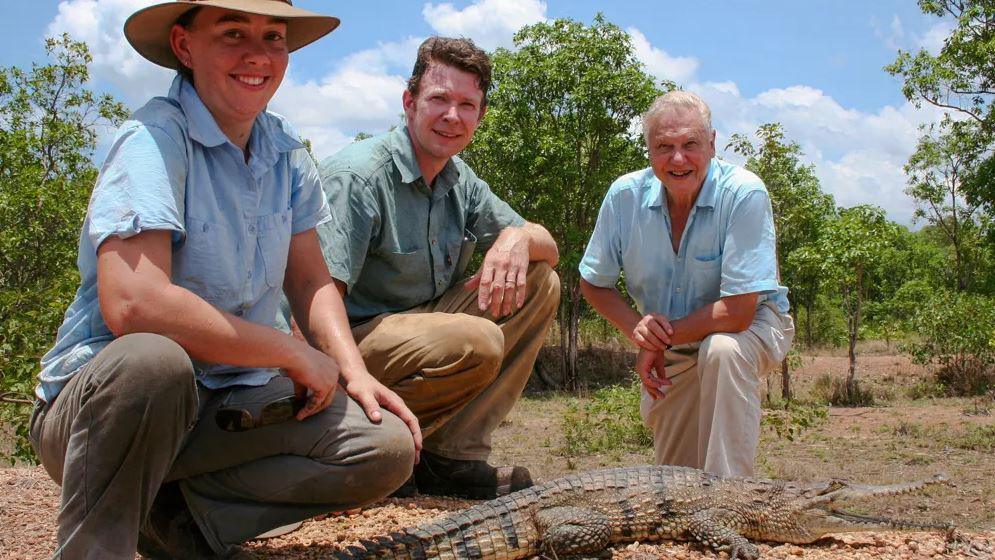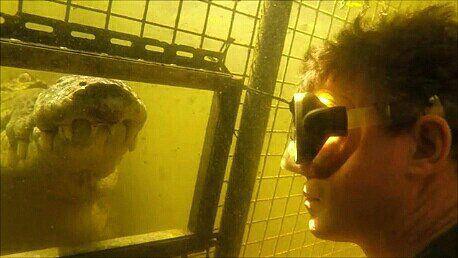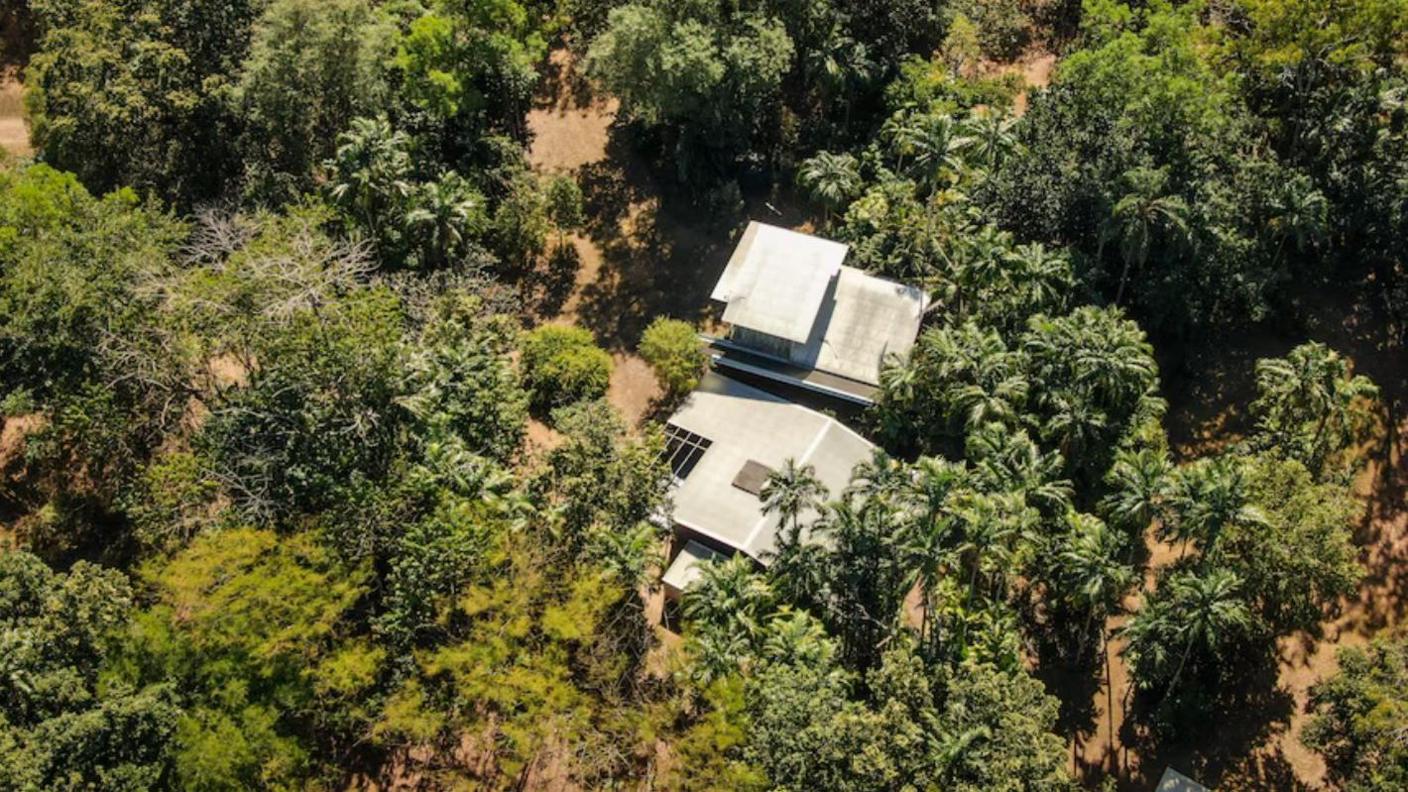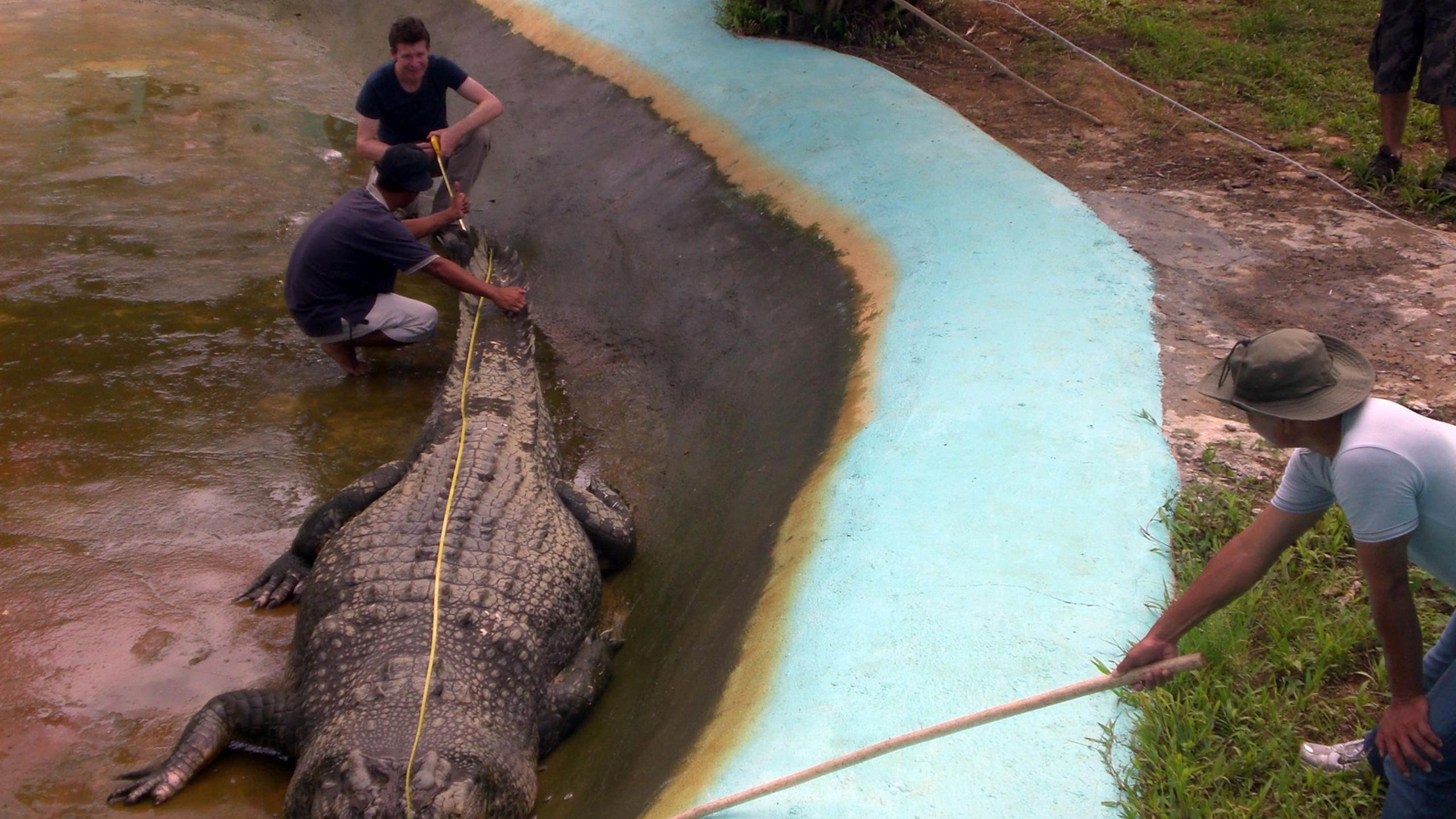Adam Britton: The ‘monster’ animal abuser who hid in plain sight

Adam Britton (centre) pictured with Sir David Attenborough
- Published
From the outside, Adam Britton seemed like a passionate – albeit quiet and nerdy – advocate for animals.
Over decades, the 53-year-old built a colourful reputation as one of the world’s leading crocodile experts.
He swam with the apex predators in the wild, lent his pet crocodile Smaug to countless films and documentaries, and even hosted Sir David Attenborough at his home in Darwin, Australia; all the while preaching the need for greater respect for the creatures.
Warning: This story contains details of abuse readers might find distressing
But Britton has now been dubbed one of the world’s worst animal abusers, this week sentenced to over a decade in jail for filming himself sexually abusing and torturing dozens of dogs. Along with 56 charges of animal cruelty and bestiality, he also admitted to four counts of accessing child abuse material.
The news sent ripples of shock and disgust around the globe, leaving some of those who knew Britton questioning how he became the “Monster of McMinns Lagoon” - a reference to the sprawling property where he committed his crimes.
Several described to the BBC a shy but friendly man, others an arrogant attention-seeker who took credit for work that was not his own. But there was one point on which they all agreed: when combing through their memories for clues of Britton’s depravity, they found nothing.
“It truly seems like a Ted Bundy type situation where you would never imagine such a thing being possible,” former colleague Brandon Sideleau says.
An early fascination with crocs
Born in West Yorkshire in 1971, court documents state that Britton had concealed a “sadistic sexual interest” in animals since he was a child and began molesting horses at the age of 13.
But beyond that, little is known about his youth in the United Kingdom.
On his blog, Britton said he was inspired to become a zoologist by three people - his mum, who was an "avid naturalist"; his biology teacher Val Richards; and Sir David, his role model.
He studied a Bachelor of Science at the University of Leeds, graduating in 1992, then in 1996 finished a PhD in Zoology – on the hunting methods of bats – at the University of Bristol.
But his dream was always to escape the UK and research crocs, he said in a 2008 interview. He’d been fascinated with them since childhood and wanted to help reframe the increasingly fraught relationship between humans and the reptiles.
“If people don’t understand [them], you don’t really have much hope of trying to convince people they are worth conserving,” he told entertainment news site Den of Geek.
So in the mid-1990s, Britton turned up on the dusty plains of the Northern Territory (NT), home to the biggest saltwater crocodile population on the planet.
There, Grahame Webb - a pioneer in the field - took the “very, very enthusiastic” young man under his wing at Crocodylus Park, a small zoo and research facility.
Britton gravitated towards filming projects, but also took part in research, including a 2005 study on the potent antibiotic powers of crocodile blood which made global headlines.
In 2006, he left to start a rival crocodile consultancy business alongside his wife, and later also took on an adjunct research role at Charles Darwin University.

Britton and Smaug the crocodile
Over Britton’s decades in Darwin’s croc research fraternity, many peers who initially thought he was shy but “nice enough” came to view him as an anti-social “odd man out”.
“He was quite up himself… so he wasn't a particularly popular person, but he was reasonably good at his job,” says John Pomeroy, who organised research field work for Crocodylus Park.
Prof Webb had seen himself as a mentor of sorts, one who gave Britton his start in the industry and the opportunity to build filming expertise, but Britton burned all bridges when he quit.
He was an egotist who passed much of the work of the team at Crocodylus Park as his own, Prof Webb alleges, and then poached their clients.
“There’s scientists and then there’s scientists,” Prof Webb tells the BBC.
“He knew everyone, and he had a lot of knowledge, but that's different. Librarians have a lot of knowledge too.
“Guys like Adam are just trying to get on the bloody news.”
Mr Sideleau – who, with Britton, co-founded an attack database called CrocBITE in 2013 - tells the BBC a similar story. Britton “loved to take credit” for the archive but had “never contributed a single incident” to it, Mr Sideleau says. He merely paid for the website domain.
'A leader in the field'
But in the broader community, Britton and his pet crocodile became stars.
After leaving Crocodylus Park, he established himself as a go-to expert on croc behaviour and made his leafy estate in McMinns Lagoon - at one point home to eight crocodiles - a global filming destination.
“He had international standing unlike anyone else,” one former friend and wildlife researcher - who asked not to be named - tells the BBC.

Britton's property - now for sale - lies on the outskirts of Darwin
When Sir David’s Life in Cold Blood documentary series came knocking in 2006, Britton built a specialised enclosure for Smaug that allowed the programme to capture ground-breaking footage of crocodiles mating.
It was a “dream come true” to work with his idol, Britton told the Daily Telegraph years later.
Given how difficult it is to film many crocodile behaviours in the wild, a circus of TV crews cycled through McMinns Lagoon.
“If you’ve ever seen an underwater shot of a saltwater crocodile, there’s a good chance it’s Smaug,” Britton told the NT News in 2018.
Steve Backshall filmed scenes for his Deadly 60 documentary, Man vs Wild’s Bear Grylls paid a visit, and even movie producers had Britton's number.
His expertise was also sought after abroad. He helped measure the world’s longest crocodile, captured in the Philippines in 2011, and in 2016 accompanied TV host Anderson Cooper on a dive with wild crocodiles in Botswana for an episode of CBS’s 60 Minutes.
“He was a leader in his field… a nice guy,” Australian director and writer Andrew Traucki tells the BBC.

Britton pictured helping measure Lolong the crocodile in Bunawan town
What did Adam Britton do?
Mr Traucki worked with Britton when filming croc horror film Black Water in 2008, as well as its 2019 sequel. He described spending many enjoyable hours on Britton’s property, kept company by his “awesome” Swiss Shepherds.
By that time, the zoologist was exploiting his own pets and manipulating other dog owners into giving him theirs, the court heard.
Using online marketplace Gumtree Australia, he would find people who were often reluctantly giving their pets away and promise to provide a “good home”.
If anyone reached out for updates, he would tell them "false narratives" and send them old photos.
Most of the time the dogs were already dead, having experienced indescribable suffering inside a shipping container fitted out with recording equipment which Britton called his "torture room".
Over the 18 months leading up to his arrest, he tortured at least 42 dogs, killing 39 of them.
British croc expert jailed for sexual abuse of dogs
- Published8 August 2024
“This is the thing that's sort of haunted me since I've heard… you would have never picked him for that," Mr Traucki says.
The news similarly rocked the broader community. Hundreds of people around the world joined social media groups dedicated to following his case, and some turned up to his court hearings arguing he should be put to death – despite the penalty being outlawed in Australia since 1985.
A small crowd even travelled to Darwin to see Britton be sentenced, crying inside the courtroom as his details of his crimes – too graphic to publish – were read aloud.
They wanted to be a voice for the pet owners swindled by Britton, most of whom are still too traumatised and guilt-ridden to speak out, as well as a visible symbol of the community’s horror.
“I would look at that man and think, ‘What an intelligent and kind man’, and then to learn of what he had done… I didn't sleep for three weeks,” one of the attendees Natalie Carey says.
With the benefit of hindsight, several people who knew Britton say there were fleeting moments when he appeared to lack empathy.
But all say there was genuinely no indication he was violent or cruel.
“It wasn’t like we saw him pulling the wings of grasshoppers just to watch them suffer. He wasn’t one of those people,” Prof Webb says.
“It’s just sad when you realise that someone you know has been so [messed] up mentally and you weren’t sharp enough to see it and do something about it."
"You do feel a sense of responsibility.”
Mr Britton's lawyer argued he had suffered from a rare disorder causing intense, atypical sexual interests since he was a child.
But in his apology letter, Britton accepted “full responsibility” for the “pain and trauma” he had caused and promised to seek treatment.
"I will find a path towards redemption,” he wrote.